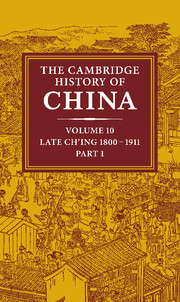Book contents
- Frontmatter
- 1 Introduction: the old order
- 2 Ch'ing Inner Asia c. 1800
- 3 Dynastic decline and the roots of rebellion
- 4 The Canton trade and the Opium War
- 5 The creation of the treaty system
- 6 The Taiping Rebellion
- 7 Sino-Russian relations, 1800–62
- 8 The heyday of the Ch'ing order in Mongolia, Sinkiang and Tibet
- 9 The Ch'ing Restoration
- 10 Self-strengthening: the pursuit of Western technology
- 11 Christian missions and their impact to 1900
- Bibliographical essays
- Bibliography
- Genealogical chart
- Glossary
- Index
- References
Bibliography
Published online by Cambridge University Press: 28 March 2008
- Frontmatter
- 1 Introduction: the old order
- 2 Ch'ing Inner Asia c. 1800
- 3 Dynastic decline and the roots of rebellion
- 4 The Canton trade and the Opium War
- 5 The creation of the treaty system
- 6 The Taiping Rebellion
- 7 Sino-Russian relations, 1800–62
- 8 The heyday of the Ch'ing order in Mongolia, Sinkiang and Tibet
- 9 The Ch'ing Restoration
- 10 Self-strengthening: the pursuit of Western technology
- 11 Christian missions and their impact to 1900
- Bibliographical essays
- Bibliography
- Genealogical chart
- Glossary
- Index
- References
- Type
- Chapter
- Information
- The Cambridge History of China , pp. 615 - 665Publisher: Cambridge University PressPrint publication year: 1978



